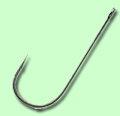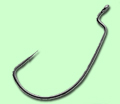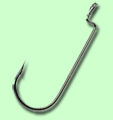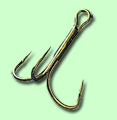IMPROVE YOUR SKILLS
Informative articles to help you better understand and utilize the Tools of the
Trade
"Back
to Basics" Vol. 4"
Hooks, Get
the Point!
In this month's "Back to Basics" we
will cover hooks. We will talk about the different styles of hooks
and when to use them. These tips will help guide you in determining
which reel to use during your next outing. These are general guidelines
that I use to help me perform better and catch more fish.
Hooks are no doubt one of the more critical components in your fishing
arsenal. Without the hook, it would be much more difficult to put fish
in the boat.
Styles:
In general there 4 basic styles of hooks: straight shank, off-set,
wide gap, and treble. Each has a time and type of bait to use them
with.
 Straight
Shank:
The straight shank hook is just that; the shank of the hook has no bend in it.
For this reason it is best used with plastics that have very little bulk or are
skinny in the mid-section. With bulkier baits the hook will have a harder time
penetrating the worm and thus not penetrating the fish's mouth. Straight shank
hooks are also the most commonly used trailer hook. The only difference is that
they are made with an expanded line tie (to fit over main hook). The larger sizes
can work well when using a "flipping" style presentation in matted grass since
they have a narrower profile. Straight
Shank:
The straight shank hook is just that; the shank of the hook has no bend in it.
For this reason it is best used with plastics that have very little bulk or are
skinny in the mid-section. With bulkier baits the hook will have a harder time
penetrating the worm and thus not penetrating the fish's mouth. Straight shank
hooks are also the most commonly used trailer hook. The only difference is that
they are made with an expanded line tie (to fit over main hook). The larger sizes
can work well when using a "flipping" style presentation in matted grass since
they have a narrower profile. |
 Wide-Gap:
Wide
Gap hooks have an off-set right behind the line tie then continue
to arch away then back towards the hook bend. This type of hook
is made for bulky baits. They will give you the most room between
the bait and the shank. This will allow the bait to bend into
the hook and cause less interference when "setting the hook".
The only down side to wide gap hooks is that they do not allow
baits to lay flat on the bottom. Due to the curve the bait will
roll to one side or the other while sitting still on bottom. Wide-Gap:
Wide
Gap hooks have an off-set right behind the line tie then continue
to arch away then back towards the hook bend. This type of hook
is made for bulky baits. They will give you the most room between
the bait and the shank. This will allow the bait to bend into
the hook and cause less interference when "setting the hook".
The only down side to wide gap hooks is that they do not allow
baits to lay flat on the bottom. Due to the curve the bait will
roll to one side or the other while sitting still on bottom. |
 Off-Set:
An off-set hook has a shank that drops right behind the line tie then a straight
shank till it reaches the hook bend. This type of hook works well with slightly
bulkier baits as it gives more room between the bait and the shank. Off-set
style hooks are also good to use when Carolina rigging. Off-Set:
An off-set hook has a shank that drops right behind the line tie then a straight
shank till it reaches the hook bend. This type of hook works well with slightly
bulkier baits as it gives more room between the bait and the shank. Off-set
style hooks are also good to use when Carolina rigging. |
 Treble:
As noted by the name, these hooks have three points. Although most are a straight
shank style some manufactures make wide gap models. You will find most treble
hooks on "hard" baits such as crankbaits and top-water baits. A good trick
for short striking bass is to tie a treble hook on as a "stinger" hook. You
can either place one directly on the main hook or on a short leader then
to the main hook. Treble:
As noted by the name, these hooks have three points. Although most are a straight
shank style some manufactures make wide gap models. You will find most treble
hooks on "hard" baits such as crankbaits and top-water baits. A good trick
for short striking bass is to tie a treble hook on as a "stinger" hook. You
can either place one directly on the main hook or on a short leader then
to the main hook. |
Hook
Diameter:
When talking about hook diameter the most common phrases will be either "light" wire
or "heavy" wire hooks. Light wire hooks are mainly used
during finesse style fishing, where heavy wire hooks are used in power
fishing applications. Light wire hooks will require a lower power rod
and non-aggressive hook sets. Otherwise, the result will be a hook
that opens and is no longer in line with the line tie causing the gap
to be too wide and easier for the fish to "throw" the hook.
Rick's
Applications:
- Straight shank - non-bulky plastic baits, straight tail worms
and ribbon tail worms up to 6 inches, trailer hooks, "flipping"
- Off-Set - plastic
lizards, Carolina rig
- Wide-Gap - bulky
plastics, creature baits and large worms
- Treble - hard
baits and stinger (trailer) hook
Rick's
Reminders:
- Match the hook
style to the "bulkiness" of the bait
- Light wire hooks
require a "finesse" style approach
I hope you have
found this month's "Back to Basics" informative
and it helps you to increase your catch! Visit my website for more
articles. If you are interested in a particular topic,
send a request to rick@ricktilson.com.
Check back next month for another informative "Back to Basics".
Thanks,
Rick Tilson
Copyright© Rick
Tilson. All Rights Reserved

